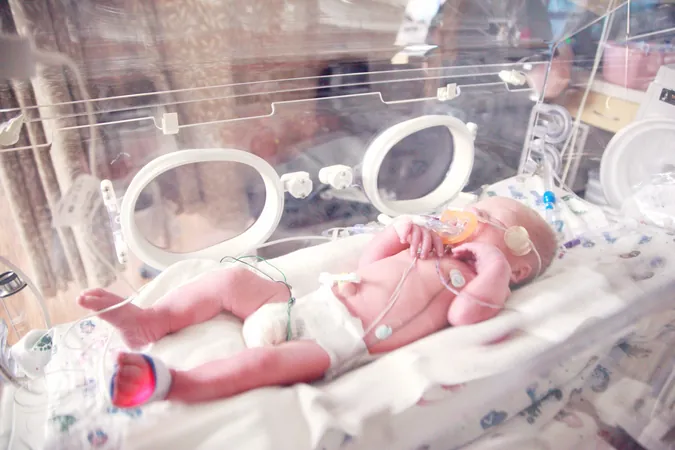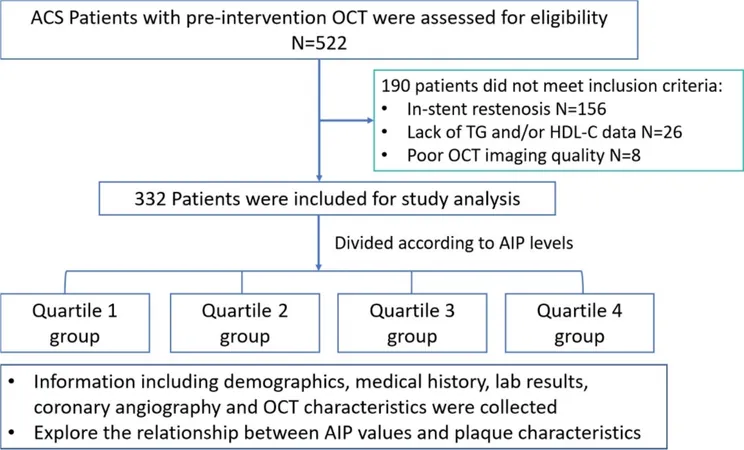
Groundbreaking Research Reveals Rotavirus Vaccine is Safe for NICU Babies - A Game Changer for Infant Health!
2024-12-09
Author: Jia
Significant Advancement in Neonatal Care
In a significant advancement in neonatal care, researchers at the Children's Hospital of Philadelphia (CHOP) have discovered that the transmission of rotavirus vaccine strains within neonatal intensive care units (NICUs) is both rare and without serious clinical consequences. This pivotal finding strongly indicates that administering the rotavirus vaccine to eligible infants during their NICU stay provides vital immune benefits that far exceed any potential risks.
Published Findings
Published in the esteemed journal Pediatrics, the study titled "Incidence of Transmission of Vaccine-Strain Rotavirus in a NICU that Routinely Vaccinates" could potentially shift clinical practices concerning rotavirus vaccination protocols. This research is particularly relevant considering the devastating impact of rotavirus, which infects the lining of the intestines and is known for causing severe symptoms such as high fever, persistent vomiting, and debilitating diarrhea.
The Impact of Rotavirus
Before the introduction of rotavirus vaccines, it was common for children to contract the virus by the age of five, leading to approximately 500,000 child deaths globally each year, along with tens of thousands of pediatric hospitalizations in the United States alone. Rotavirus remains a leading cause of gastrointestinal illness in young children, emphasizing the urgent need for effective preventive measures.
Vaccination Timing and Concerns
Typically, the first dose of the rotavirus vaccine is administered at two months of age. However, many NICUs historically withhold the vaccine because of concerns regarding theoretical horizontal transmission, where vaccinated infants might shed live, attenuated strains of the virus in their stool, potentially endangering vulnerable, unvaccinated patients.
Risks of Postponing Vaccination
Postponing the vaccination until infants are discharged from NICU care can leave many infants with extended hospital stays—posing a significant health risk for those most susceptible to severe rotavirus infections due to pre-existing health conditions. Previous studies have suggested that the risk of transmission is minimal in NICU contexts, and the recent research from CHOP reinforces this perspective.
Expert Insights
Dr. Susan E. Coffin, an infectious disease expert at CHOP and co-senior author of the study, expressed her surprise at the infrequent nature of vaccine strain transmission and the absence of clinical symptoms in cases where it did occur. “Our findings provide reassuring evidence regarding the low risk of transmission and the high probability of benefiting these vulnerable infants through timely vaccination,” Dr. Coffin stated.
Study Methodology
The comprehensive study involved collaboration across multiple divisions within CHOP, utilizing resources from the Division of Infectious Diseases, Division of Neonatology, and the CHOP Research Institute. Over the course of one year, researchers analyzed stool samples from all patients admitted to the 100-bed NICU, collecting data that included 226 doses of the RotaTeq vaccine and over 3,400 stool samples from both vaccinated and unvaccinated infants.
Findings and Highlights
Out of 686 unvaccinated patients, a staggering 99.3% (681 infants) tested negative for rotavirus vaccine strains, with only five cases demonstrating positive results—none of which manifested any gastroenteritis symptoms.
Broad Implications
Dr. Kathleen A. Gibbs, an attending neonatologist at CHOP, noted, “The unique layout of our NICU, featuring both private rooms and open pods, suggests that these findings can be applicable to a variety of NICU environments, making it an essential consideration for better practices across the board.”
Conclusion and Future Directions
With these groundbreaking findings, the CHOP study adds to the existing body of safety data, driving home the crucial message that the known benefits of administering the rotavirus vaccine in NICUs far outweigh the minimal risks associated with vaccine-strain transmission. As healthcare professionals advocate for changes in vaccination practices, this research holds promise for dramatically improving infant health outcomes in NICUs around the world!
Stay Tuned
Stay tuned as we keep you updated on further developments in infant healthcare innovations!


 Brasil (PT)
Brasil (PT)
 Canada (EN)
Canada (EN)
 Chile (ES)
Chile (ES)
 España (ES)
España (ES)
 France (FR)
France (FR)
 Hong Kong (EN)
Hong Kong (EN)
 Italia (IT)
Italia (IT)
 日本 (JA)
日本 (JA)
 Magyarország (HU)
Magyarország (HU)
 Norge (NO)
Norge (NO)
 Polska (PL)
Polska (PL)
 Schweiz (DE)
Schweiz (DE)
 Singapore (EN)
Singapore (EN)
 Sverige (SV)
Sverige (SV)
 Suomi (FI)
Suomi (FI)
 Türkiye (TR)
Türkiye (TR)